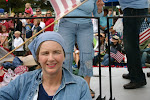Random Lengths News posted an online version of my article about the women's march, "Women's Rights, Trump at Historic Crossroads" which is also printed in the Jan. 25-Feb.7, 2018 issue:
http://www.randomlengthsnews.com/2018/01/womens-rights-trump-historic-crossroads/
Should the link be down, here's an edited version:
January 20, 2017:
Donald Trump became president, Republicans dominated Congress, and the
outlook on any progress for women looked bleak. Republicans had been waging political
war on women’s rights for more than a quarter-century—and now appeared able to
pass and enforce any anti-woman laws they pleased, at least until the 2018
elections.
Women wasted no time mounting opposition. On January 21, millions
of women—and others—took to the streets to peacefully and legally demand
women’s rights. A protest that started as a social-media post by some
disappointed Hillary Clinton supporters morphed into a historical global action.
Mobs of protestors thronged to great American metropolitan areas including
Washington, New York, Chicago and Los Angeles, as well as red-state capitals
like Little Rock, Arkansas, and small towns like Chelan, Washington.
What women’s political empowerment could do was abundantly
demonstrated in several states’ off-year elections in November: Democrats turned Virginia, New Jersey,
Washington, and even Oklahoma a little bluer. According to Steven Rosenfeld at
Alter-net, “The nation’s leading voter turnout
experts said the race was marked by women voting in historically high numbers
and overall voter turnout exceeding expectations in non-presidential years.”
On Keith Olbermann’s video-blog “The Resistance,” he noted
about half of November’s election results could be seen as morality plays. In
Oklahoma a young lesbian Democrat won in a district chockful of Trump
supporters. In Virginia a Democrat who identified as transgender beat a
Republican who campaigned on keeping public restrooms safe from transgender
intruders. A man who lost a woman to gun violence beat a pro-NRA Republican.
As 2017 concluded, Time magazine chose some women it labelled
“silence breakers” for its Dec. 10 “Person of the Year” cover. Some were famous
(singer Taylor Swift, actress Ashley Judd), others ordinary (engineer Susan
Fowler, farmworker Isabel Pascual, lobbyist Adama Iwu, and an anonymous woman
only partly seen). Together they represented what Time characterized as the
“#metoo” movement, from a Twitter hashtag where thousands of women (and men)
had recently begun sharing experiences of sexual harassment. The accompanying
lengthy article reported dozens of them. Some were formal legal complaints,
others were, well, “just” complaints.
Time was referencing a new surge of outrage against sexual
harassment—the movement’s birth may have been Oct. 5, when the New York Times broke the story that
powerful Hollywood producer Harvey Weinstein had a history of sexual harassment.
Judd, Rosanna Arquette, Lupita Nyong’o, Daryl Hannah, Angelina Jolie, Rose
McGowan, and Gwyneth Paltrow were among the dozens of actresses and other
working women who reported incidents with Weinstein. In the backlash he was run
out of Hollywood.
The fallout turned into a mighty stream that’s still
cascading, as public accusations which a short time ago might have been
scorned, mocked, or simply pushed aside as lacking “evidence” are suddenly
being taken seriously. The lasting effect on America’s political landscape is uncertain
as the 2018 election season looms.
So far the outrage has only resulted in the downfall of two
major politicians—both Democrats. Sen. Al Franken resigned after several women
accused him of kissing them without their consent years ago. Rep. John Conyers,
a civil-rights icon who presided over Nixon’s downfall, resigned after his
history of settling sexual harassment complaints was revealed. Both men were
dependable votes for women’s rights, but their party told them they had to go.
At the same time Republicans—the party and its voters--appear
to care little, if at all, about credible allegations of outright sexual abuse,
including complaints about Trump, Alabama senate candidate Roy Moore, and others
who openly despise women’s rights. Election season 2018 will tell whether voters
will continue to allow Republicans to make war on women. The Trump presidency
has put women at a historic crossroads.
